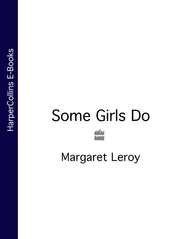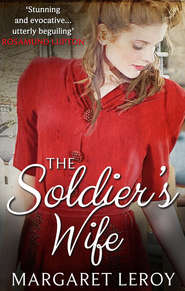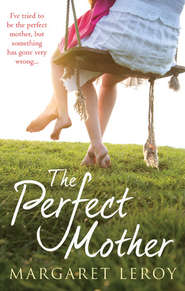По всем вопросам обращайтесь на: info@litportal.ru
(©) 2003-2024.
✖
The Drowning Girl
Автор
Год написания книги
2018
Настройки чтения
Размер шрифта
Высота строк
Поля
There’s a photo of Adam Winters with the article. It’s a grainy photo; you can’t really see him clearly. He’s lean and dark, and his chin is shadowed with stubble, and he has a startled air, as if someone has just called his name. I contemplate the photo for a moment. I decide he’s the kind of man who’d corner you at a party and stand too close and talk at length about some obsession of his: someone who’d undoubtedly think that I was rather frivolous. Then I smile at myself, for conjuring up this entire persona for him.
I can hear the edgy, mosquito whine of a drill from one of the surgeries. I don’t want to think about it. I focus on the article, which has lots of stories of local ghosts. There’s a gallery at Hampton Court that’s haunted by the ghost of Kathryn Howard, whom Henry VIII beheaded: dogs won’t go over the threshold. Adam Winters and his colleagues visit the sites of the hauntings, and measure fluctuations in electromagnetic fields.
I ask him if he believes in ghosts, but he’s guarded and non-committal. He tells me, ‘A scientist should never say that anything is impossible…’
I look up as the woman in the black business suit is called in. I notice how stiffly she moves, her body fragile as eggshell. Then the door bangs shut behind her, and I’m alone in the room.
I turn back to the paper. I skim through the rest of the article, and am about to turn the page when the last few lines spring out at me as though they are illuminated.
But Adam doesn’t confine his researches to ghostly apparitions. One of the cases he’s currently investigating is that of four-year-old Kevin Smith (not his real name). Kevin wakes sobbing every night and says he wants to go home, and sometimes he talks about a place where he says he used to live. His mother wonders if Kevin is remembering a previous life…
The room tilts. I can feel my heart, its rapid, jittery beat.
I put it to Adam that many children live in a fantasy world. ‘Of course,’ he says. ‘And that’s why we have to look at these cases very carefully. In fact, accounts of children apparently remembering past lives are actually quite common, though most of them come from cultures which have a belief in reincarnation, like the Druse of Lebanon.’ And he tells me there are psychiatrists who claim to use past life regression to heal physical symptoms and phobias…
I ask him what he thinks of all this. ‘I’ve never investigated a past life case that I found completely convincing,’ he tells me. ‘But there’s a US psychiatrist, Dr Ian Stevenson, who devoted his life to exploring this phenomenon—and some of his cases are really very persuasive.’
I jump as my dentist’s door swings back. An elderly man in a drab grey coat comes out; he’s touching his face with his fingers, as though to check that it’s still there. The dentist’s wife takes his credit card. I read hungrily on, my heart juddering.
So what does Adam make of Kevin? He’s diplomatic: he gives me a guarded smile. ‘As a scientist, I never say never,’ he tells me.
Have you had an experience that you can’t explain? Adam Winters would love to hear from you. You can contact him at this e-mail address…
I grab my bag and scrabble around for a pen.
‘Ms Reynolds, could you come in now?’
The dentist is standing at the door of his surgery. I fold up the paper and tuck it under the magazines.
I get in the chair, and the dentist pokes around in my mouth. He’s a bony, lugubrious, kindly man. He allows himself a melodramatic sigh.
‘And when did you last come to see me?’ he says.
‘I can’t remember exactly. I’m afraid it’s quite a while.’
He shakes his head, as though wearily resigned to human weakness.
‘I’ll see what I can do,’ he says mournfully. ‘But in the end we’ll probably have to extract it.’
He drills my tooth, puts in a filling, prescribes some antibiotics.
‘To be honest, I really don’t know if this is going to work,’ he says. ‘You should make an appointment for eight weeks’ time. But any trouble, you come back sooner, OK? Any twinges.’
I promise that I will.
I go back into the waiting room. The dentist’s wife follows. If she weren’t here, I might steal the TwickenhamTimes. The work will cost a lot: I arrange to pay in instalments. She fixes my next appointment.
Outside, I’m amazed that everything is just the same as it always was: the lumbering buses, the crowd of pedestrians jostling at the traffic lights—all solid, vivid, predictable, just as they were before.
CHAPTER 10
It’s a cold, dreary December: dark days, with a raw, searching wind that often has flakes of snow in it, and sometimes a rain that looks like water but feels like ice on your skin. In our garden, the mulberry branches are bare, and the lawn is muddy and sodden, and leaves from the trees in the Somerfield car park drift up against the wall, their extravagant russets and yellows darkened and dulled by the wet. It’s a struggle to keep the flat warm, with the ceilings so high and the heating so elderly and erratic; the wind sneaks in through every little crack. At night I pile my coats on top of Sylvie’s duvet.
At the flower shop, we’re stocking up for Christmas, with poinsettias, and amaryllis bulbs, and mistletoe that I love for the remote, pearly glow of its berries, like something seen through clear water. And Lavinia buys in willow wands and patchwork scraps of fabric, and when the shop is quiet we sit in the room at the back and make up Christmas garlands—some of them very simple, woven from twisted twigs, and more formal, traditional ones with ribbon and berries and greenery; and sometimes I like to use colours and fabrics that nobody else would think of—bows of brown paper, or shimmery Indian ribbon. When I get home, my hands still smell of juniper.
A letter comes, with the Arbours Clinic slogan on the envelope: Helping Families Help Themselves, and a rainbow drawn by a child. I feel a rush of hopefulness. Now someone will come to our rescue, someone will understand. I rip the envelope open. We have an appointment with Dr Strickland at the start of January. I’m pleased—it doesn’t seem too long to wait. I worry that Sylvie’s trainers are scruffy—I don’t want them to think that I am a neglectful parent—and I take her to buy some new shoes for the appointment—pink suede boots with laces that I can’t really afford.
I yearn for Dominic. I ring the house in Newgate Road, hoping to hear him on the voicemail, so hungry for something of him, just for a moment to have his voice vibrating inside me. I choose a time when Claudia should be meeting their children from school, but to my horror it’s Claudia who answers. I put the phone down rapidly, ashamed.
And all the time I wonder about the article I read. Sometimes—most of the time—I tell myself it was nonsense, a deluded, New-Agey fantasy. I remind myself that people need something to cling to—anything to protect ourselves from knowing, really knowing, that we are mortal beings. Sometimes the mind won’t let that knowledge in.
I remember the night my mother died. I’d spent several hours that afternoon at her bedside in the hospital; she’d been doing so well with all her rehabilitation, she was starting to walk again, two months after her stroke. She’d been sitting up in bed, alert and vivid, wearing the bright new bedjacket I’d brought her, and with some lipstick on; and talking about what she’d do when they discharged her—the pelargoniums she was longing to plant. She was worried she’d missed the start of the growing season. The ward sister rang at eleven that night to say she’d died. I just said, ‘No, she hasn’t.’ My voice quite calm and unconcerned. ‘Really. Don’t worry, she’s fine, I was with her this afternoon…’ I simply didn’t believe it. When the nurse persisted, I thought it was a practical joke. I actually said that. ‘This is a joke, isn’t it? You’re having me on…’ She wasn’t thrown. It can’t have been the first time this had happened to her. She kept on talking, her manner gently insistent. ‘Miss Reynolds, I’m really sorry, but you need to listen to me. I’m ringing from Stanton Ward. Your mother had another stroke. This time it was a massive one. It was very sudden. She wouldn’t have felt any pain…’ But I couldn’t take it in. Just couldn’t. As if there were a door in my mind, shut fast—that couldn’t be prised open, wouldn’t let this knowledge through. And mostly I think that’s what all these beliefs are, really: doors in the mind, keeping the dark out.
Yet sometimes I find myself thinking: Perhaps it’s true—perhaps the soul goes on. Perhaps some of us have a memorytrace—some imprint of a previous life—or a psychic linkwith the past… And always, just wondering that—just touching on it so lightly, even for a second or two—there’s a sense of something shifting—the present, certain, obvious world dissolving all around me, as everything I thought I knew begins to fall away.
Sometimes I wonder about Adam Winters, and kick myself that I didn’t manage to note down his e-mail address. At least I’d have a choice then. But I can’t imagine how it would be if I met him, or what on earth he’d make of Sylvie and me. I simply can’t envisage it. I think of him in his university department—his glamorous career, his adulatory students—and me in my flat in Highfields, cooking chicken nuggets, reading old copies of Heat. And what might it do to Sylvie—to give so much weight and attention to all the strange things that she says? Everything might get worse then. There are lots of good reasons to forget all about him. I tell myself it’s as well that I don’t know how to reach him: at least it stops me from doing anything rash.
‘Lavinia,’ I say one morning. We’re working at the back of the shop. It’s a bitter day, with a light sleet thrown on the wind. ‘Lavinia—there was this thing I read. About the paranormal—ghosts and so on. This guy who researches into it. D’you believe in all that?’
She’s wearing a fisherman’s sweater: long cuffs of heavy oiled wool hang over her hands. She pushes her sleeves up, folding them over and over; her gestures are so graceful. She has many silver rings, and a cinnamon staining of nicotine on the insides of her fingers.
Her thoughtful grey eyes rest on me. There’s a question in them.
‘It depends which bit you mean,’ she says then. ‘I do believe in the spirit world—that there’s a spiritual dimension.’ She gives a little self-deprecating shrug. ‘For God’s sake, Gracie, you know me.’
I smile, and think of the house where she lives—the Tarot cards, the crystals in her windows, and in her hall a low black table with beeswax candles on; and when she throws one of her parties, she sticks a notice to it: ‘Buddhist altar: please do not put your glasses here.’
‘Sometimes…’ she says slowly. ‘Sometimes I think—What if we just don’t get it? What if our dying isn’t at all as we’ve always believed it to be?’
She comes across to me, rests her hand for a moment on my shoulder. I’m making tree decorations—diminutive pipe-cleaner angels, with frocks of blackberry silk.
‘Hey—those are yummy. You clever girl…’ She turns from me, spoons coffee into our cups, pours water from the kettle. ‘Why are you asking anyway?’
‘It’s just this thing I read.’
She waits for a while, but I don’t say anything more.
‘Mind you,’ she says then, ‘you have to be a bit careful. People are gullible. It’s easy to start believing all kinds of crazy stuff…’
Out of the window, the sleet is starting to thicken; big feathery flakes of snow sift gently down. I can tell she’s musing on something. I wait for her.
She stirs sugar into her coffee. As her hand moves around her intricate rings give off glints and sparkles of light.
‘When I was a physio student,’ she says, ‘I had a skeleton to study. I kept it under my bed. And I had no end of bad luck—my boyfriend had dumped me and everything seemed to go wrong.’
The warmth of the coffee spreads through me. I drink gratefully. Outside, snow stitches its pattern.
‘And Teresa, my friend—she’s Irish and superstitious as hell, and she said it was the skeleton that was making all this happen. And she marched me off to Brompton Oratory to get the skeleton blessed. We took it in a Top Shop bag.’ She shakes her head slowly. ‘I mean, can you imagine? And we met this priest, he was absolutely ancient, he had this kind of pleased air. I guess he couldn’t believe his luck. Two girls in very short skirts with a carrier bag full of bones…’









